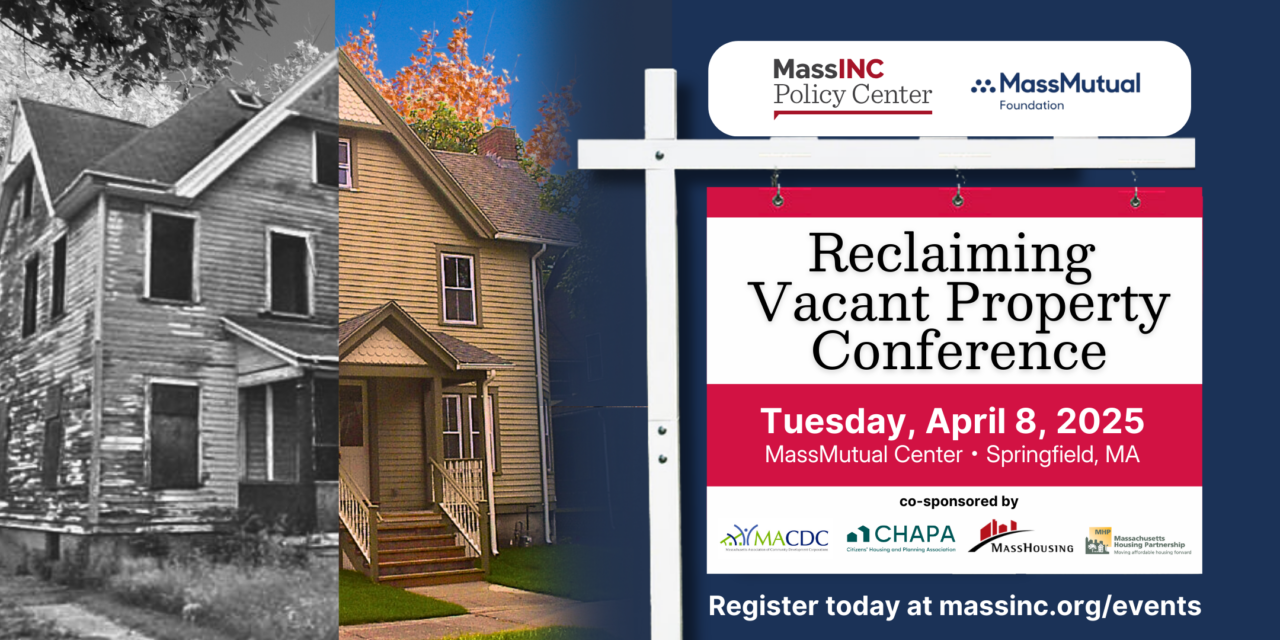Join the MassINC Policy Center for the Reclaiming Vacant Property Conference on Tuesday, April 8, 2025, at the MassMutual Center in Springfield, MA. This important event is dedicated to addressing vacant and distressed properties and exploring innovative solutions for revitalizing neighborhoods. This conference will provide valuable insights for municipalities, developers, and stakeholders interested in using strategic tools to combat blight and promote affordable housing opportunities.
This conference serves as a starting point for cities and towns to gain the knowledge and resources they need to tackle vacant properties in their communities. Whether you’re facing challenges related to code violations or tax title issues, this event will outline practical solutions and highlight recent legal updates and tools, such as amendments to Massachusetts laws related to receivership and tax title foreclosure. Specifically:
- Receivership: Learn how the recently amended receivership statute can be used to repurpose vacant, distressed properties into affordable homeownership opportunities. This model, piloted in Western Massachusetts, provides an effective way to reduce blight and foster neighborhood revitalization.
- Tax Title: Discover the recent changes to Massachusetts’ property tax foreclosure laws in response to a U.S. Supreme Court decision that impacted tax foreclosure systems. Learn how municipalities can leverage these changes to deal with vacant, distressed properties in their community.
Don’t miss this chance to learn from experts, connect with peers, and gain the resources you need to make a real difference in your community.
Do you have a question for our panelists?
We want to hear from you. Submit your questions to help guide the conversation during the event. Your input will also help us provide the most relevant follow-up resources and support after the conference.
Agenda
- Welcome
- Joe Kriesberg – CEO of MassINC
- Alison Mathias – Head of Community Responsibility Strategy, MassMutual and Vice President of the MassMutual Foundation
- Keynote
- Sec. Ed Augustus – Executive Office of Housing & Livable Communities
- Presentation | Strategic Code Enforcement and Cross-Sector Collaboration
- Steve Barlow & Danny Schaffzin – Co-Founders of the Strategic Code Enforcement Management Agency (SCEMA)
- Panel | Developments in Receivership and Tax-Taking
- Dina Fein – MassINC Torres Sr. Fellow and Retired Housing Court Judge
- Amber Villa – Chief of the Neighborhood Renewal Division, Attorney General’s Office
- Gerry McCafferty – Director, Office of Housing, City of Springfield
- Lunch and Remarks – Mayor Domenic Sarno of Springfield
- Panel | Programs to Help Finance Your Projects
- Beverly Estes-Smargiassi – Neighborhood Stabilization Program Manager, MassHousing
- Carolyn Valli – CEO of Central Berkshires Habitat for Humanity
- John Gilbert – Real Estate Development Project Manager, Way Finders
- Josh Amaral – Director of Housing and Community Development, City of New Bedford
- Closing
Confirmed Speakers
In order of appearance. Click to read speaker information.
Alison Mathias, Head of Community Responsibility Strategy, MassMutual and Vice President of the MassMutual Foundation

Alison Mathias is a social changemaker, connecting private sector resources to build capacity for community-driven solutions that instigate greater access to opportunity for all.
As the leader of MassMutual’s community impact strategy, Ali helped establish, develop, and now serves as the Vice President of the MassMutual Foundation. Initiating a transition from transactional philanthropy to catalytic philanthropy, she engaged stakeholders in co-creating solutions towards shared goals in alignment with MassMutual’s vision of financial well-being for all Americans. Ali is now advancing the MassMutual Foundation toward transformative philanthropy, seeking collaboration that meets the national scale of challenges to achieving financial resilience.
Secretary Edward Augustus, Executive Office of Housing and Livable Communities
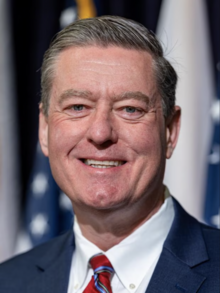
Edward Augustus is the Secretary of the Executive Office of Housing and Livable Communities. Augustus served as City Manager of Worcester, functioning as the Chief Administrative and Executive Officer of the Gateway City of more than 200,000 people, from 2014-2022. During his tenure, he oversaw the commitment or distribution of $25.3 million in Community Development Block Group, HOME Investment Partnerships Program, and Worcester Lead Abatement and Healthy Homes Program funds to develop or preserve more than 2,000 affordable housing units throughout the City.
Augustus also dedicated $30 million of the ARPA funds coming into the city to housing, including $15 million for the Affordable Housing Trust Fund. As City Manager, Augustus managed a $750 million budget, as well as the $90 million, 20-year Urban Revitalization Plan. Notably, he spearheaded the $240 million landmark redevelopment of Worcester’s Canal District. Prior to joining the City of Worcester, Augustus served as Director of Government & Community Relations for the College of Holy Cross, State Senator for the 2nd Worcester District, Chief of Staff for Congressman Jim McGovern, and Chief of Staff to the Assistant Secretary for Intergovernmental and Interagency Affairs at the U.S. Department of Education under President Clinton’s Administration. He most recently served as Chancellor of Dean College.
Steve Barlow and Danny Schaffzin, Co-Founders of the Strategic Code Enforcement Management Academy (SCEMA)
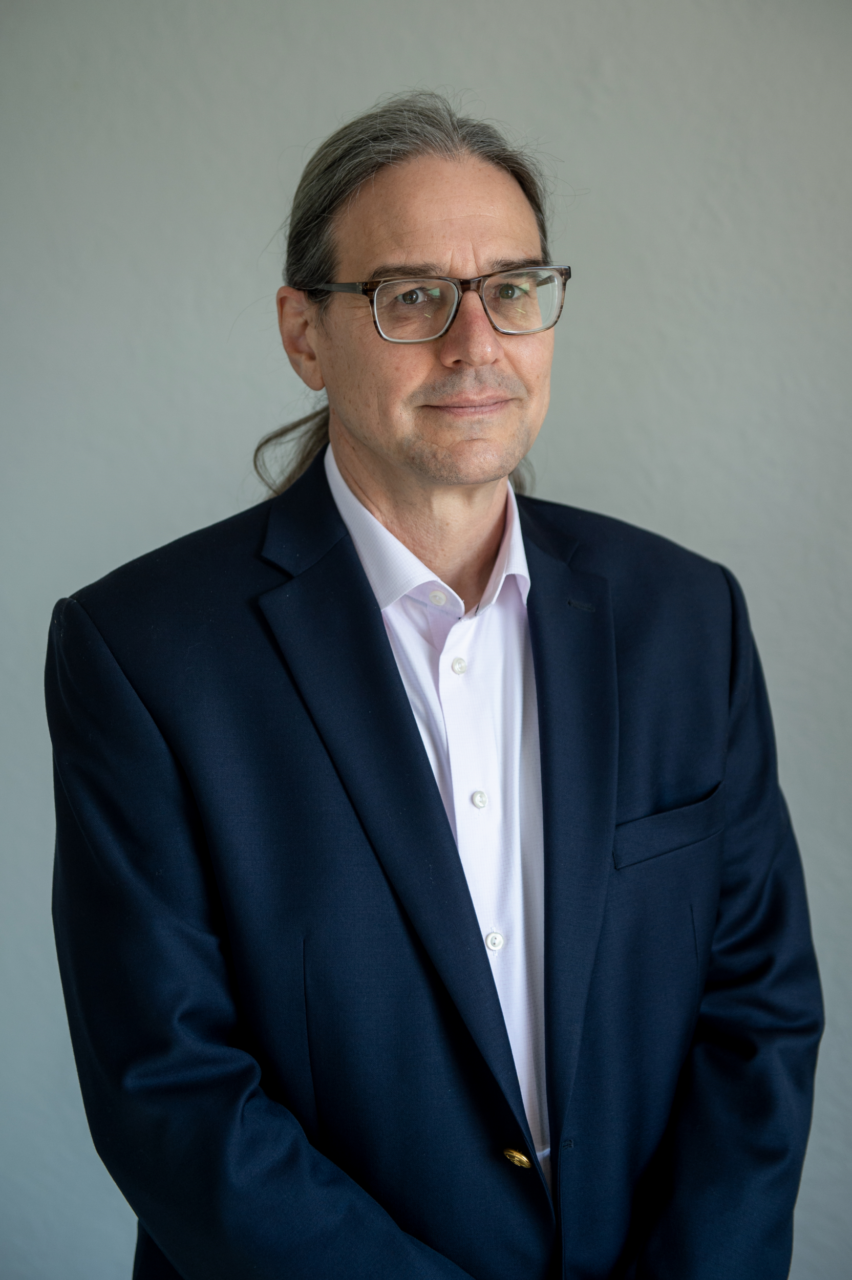

Steve Barlow and Danny Schaffzin are at the forefront of neighborhood preservation and blight abatement efforts in Memphis, Tennessee. With extensive experience in law, community development, and legislative advocacy, they have been instrumental in shaping policies and legal strategies to combat property neglect and strengthen urban neighborhoods.
Steve Barlow serves as Vice President and General Counsel of The Works, Inc. and previously led Neighborhood Preservation, Inc. as President. Since 1995, he has been deeply involved in community organizing, legislative advocacy, and neighborhood revitalization. His work includes utilizing civil litigation in Shelby County Environmental Court to hold negligent property owners accountable, as well as managing public nuisance litigation for the City of Memphis and the Downtown Memphis Commission. Steve also co-founded and teaches the Neighborhood Preservation Clinic at the University of Memphis School of Law, where law students engage in anti-blight litigation.
Danny Schaffzin is an Associate Professor of Law and Director of Experiential Learning at the University of Memphis Cecil C. Humphreys School of Law. As Co-Director of the Neighborhood Preservation Clinic, he leads faculty and law students in representing the City of Memphis in legal action against blighted properties. In addition, he serves as a Senior Assistant City Attorney for Neighborhood Preservation, further solidifying his impact on citywide efforts to improve housing conditions.
Together, Barlow and Schaffzin have played a pivotal role in the Strategic Code Enforcement Management Academy (SCEMA)—an educational initiative dedicated to strengthening the capacity of leaders involved in state and municipal code enforcement. With backing from the University of Memphis and Neighborhood Preservation, Inc., and with initial funding from the Kresge Foundation, SCEMA launched in 2017 as a first-of-its-kind program providing comprehensive training to public officials, attorneys, urban planners, and community advocates. Their vision is rooted in the collaborative efforts that led to the Blight Elimination Charter, a groundbreaking 2016 agreement uniting municipal, county, and public interest leaders in Memphis around a shared commitment to eradicating property blight.
Through their legal expertise, advocacy, and educational leadership, Barlow and Schaffzin continue to make Memphis a national model for innovative, community-driven solutions to urban blight.
Dina Fein, MassINC Torres Senior Fellow and Retired Housing Court Judge
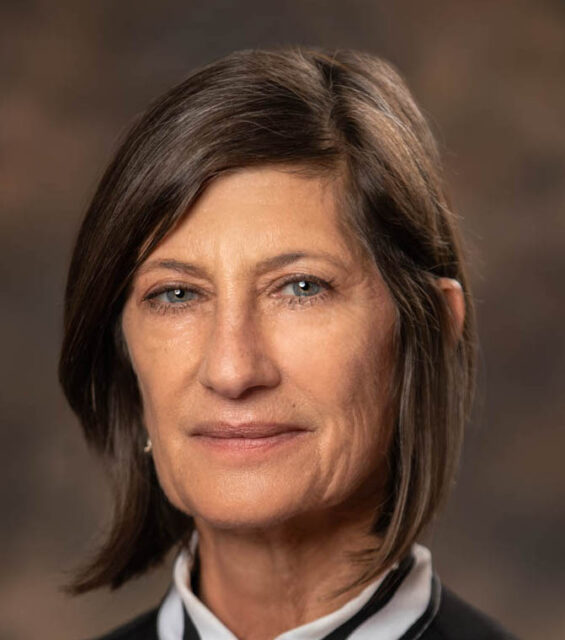
Dina Fein is a retired judge and thought leader focused on advancing access to justice, neighborhood stabilization, and affordable homeownership. Having served on the Massachusetts Housing Court for 21 years, Judge Fein has subject matter expertise in all areas of the law related to housing and a unique perspective on the role of housing on individuals, families, and communities.
Since retiring from the bench, Judge Fein has been a leading advocate at the intersection of initiatives to enhance access to justice and promote housing stability. Judge Fein designed and operationalized the City of Homes project in Springfield, Massachusetts, which seeks to transfer vacant distressed properties to nonprofits for rehabilitation and affordable sale to income-eligible first-time homebuyers. She assisted in obtaining $3M in seed funding for the project, which she is now helping to scale beyond Springfield. A founding member of the Vacant Property Receivership Consortium at the Cecil C. Humphreys School of Law at the University of Memphis, Judge Fein is also the Interim Director at the Western New England School of Law Center for Social Justice.
Appointed to the Western Division of the Massachusetts Housing Court Department in 1999, Judge Fein became First Justice in 2008 and was cross-designated to sit in the District Court, Juvenile Court, and Superior Court departments. In 2009, Judge Fein was appointed by the Chief Justices of the Supreme Judicial Court and the Trial Court to lead Access to Justice initiatives across the Massachusetts court system, launching and operationalizing statewide efforts to simplify court processes, expand legal assistance programs, and better accommodate the public. A recipient of judicial excellence awards from the Massachusetts Bar Association and the Massachusetts Judges Conference, Judge Fein has served on numerous judicial and professional committees, including the Massachusetts Access to Justice Commission (Executive Committee), the Trial Court’s Strategic Leadership Team (Domain Lead), and the Statewide Steering Committee for the Tenancy Preservation Program (Chair).
A graduate of Emory College and the Emory University School of Law, Judge Fein began her career with the Atlanta Legal Aid Society and was a partner in Fein, Pearson, Emond & Fein in Springfield for 14 years. An Adjunct Professor at Western New England University School of Law, Judge Fein has guest lectured at Harvard Law School, Suffolk University Law School, and New England School of Law, and is a frequent speaker around the county on the topics of access to justice and housing stability.
Gerry McCafferty, Director, Office of Housing, City of Springfield
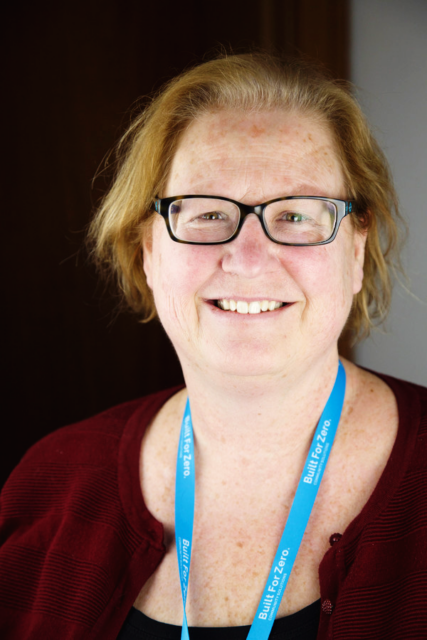
Gerry McCafferty is the Housing Director for the City of Springfield. In that role, she oversees City funding and policy regarding housing development, neighborhood stabilization, homeownership and property redevelopment initiatives, and homeless and special needs housing.
Gerry led Springfield’s recovery efforts coming out of the Great Recession, overseeing the City’s Neighborhood Stabilization Program work. She coordinated the city’s housing development following the 2011 tornado that destroyed hundreds of units of housing. She has been instrumental in designing programs and bringing in millions of dollars of grant funding to support housing rehabilitation for homeowners.
Gerry has been with the City since 2006. Previously, she was a legal services housing attorney for 15 years. She has a law degree from Georgetown University and a master’s degree in Urban and Regional Planning from the University of Colorado-Denver.
Amber Villa, Chief of the Neighborhood Renewal Division, Massachusetts Attorney General’s Office
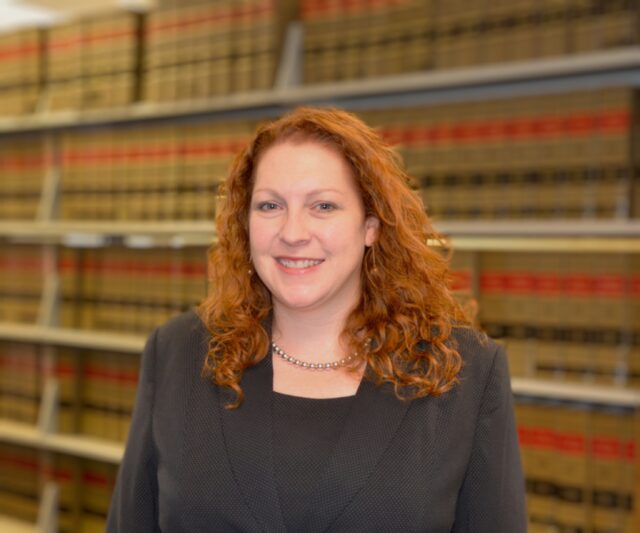
Amber Villa is the Chief of the Neighborhood Renewal Division in the Massachusetts Attorney General’s Office, leading efforts to revitalize abandoned properties, expand affordable housing, and support municipalities in ensuring safe, habitable homes.
The Neighborhood Renewal Division, created from the Attorney General’s Abandoned Housing Initiative (AHI), uses the enforcement authority of the State Sanitary Code to turn around abandoned residential properties. Partnering with cities and towns, the division identifies negligent property owners and urges them to make repairs. If they refuse, attorneys petition the courts to appoint a receiver to bring the property up to code, helping restore homes for Massachusetts families. Since 2017, AHI has revitalized over 450 properties in 146 communities and recovered more than $1 million in unpaid municipal fees.
Villa has been a key figure in housing policy, serving as Director of AHI since 2016. Since joining the Attorney General’s Office in 2008, she has worked on major housing and mortgage lending cases, including the National Mortgage Settlement, and helped launch the AGO’s HomeCorps program for foreclosure relief. She also led tobacco enforcement efforts, helping implement statewide e-cigarette regulations.
Previously, Villa practiced law at Dechert LLP and Sally & Fitch. She holds a law degree from Boston College Law School and a bachelor’s degree from Colorado College. She lives in Cambridge with her husband and son.
Mayor Domenic Sarno, City of Springfield
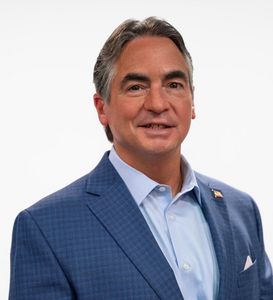
Mayor Domenic J. Sarno, Springfield’s longest-serving mayor, is dedicated to economic development, financial stewardship, and community-driven initiatives. First elected in 2007, he is now in his historic sixth term, focusing on quality-of-life improvements, education, housing, and public safety.
Sarno has prioritized housing development, overseeing major investments in affordable and market-rate housing, neighborhood revitalization projects, and homeownership initiatives. His administration has advanced projects like the Gemini Townhomes, 31 Elm Street redevelopment, and numerous housing construction and improvement efforts to expand access to quality living spaces.
Sarno has guided the city through significant challenges, including natural disasters, a recession, and the COVID-19 pandemic, while maintaining Springfield’s highest-ever bond rating. His administration has overseen $5 billion in public and private investment, revitalizing the city’s economy, arts, and culture.
A strong advocate for fiscal responsibility and community engagement, Sarno continues to lead efforts that ensure a prosperous future for all Springfield residents.
Josh Amaral, Director of Housing and Community Development, City of New Bedford
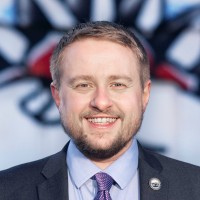
Josh Amaral proudly serves the City of New Bedford as the Director of the Office of Housing & Community Development, an excellent team devoted to responding to community needs, developing housing & public facilities, alleviating homelessness, and supporting the city’s non-profits and other institutions. In 2023, responding to the regional housing crisis, Josh led the development of Building New Bedford, the City’s comprehensive strategy to increase housing development and related services. In 2024, the office took on management responsibility for the New Bedford Redevelopment Authority.
Josh previously served as Assistant Executive Director at PACE, New Bedford’s Community Action Agency, serving over 30,000 individuals each year ranging from early childhood and adult education to health, housing, food, and other basic needs supports.
He holds a B.A. in Political Science and Master of Business Administration with a concentration in Public Management from UMass Dartmouth, where he was a Commonwealth Scholar. A product of public schools and a proud graduate of New Bedford High School, Josh served on the New Bedford School Committee for eight years, winning election as the youngest official in the city’s history. He is a lifelong New Bedford resident, living in the city with his wife Sharon, son Jack, and dog Carly.
Beverly Estes-Smargiassi, Neighborhood Stabilization Program Manager, MassHousing
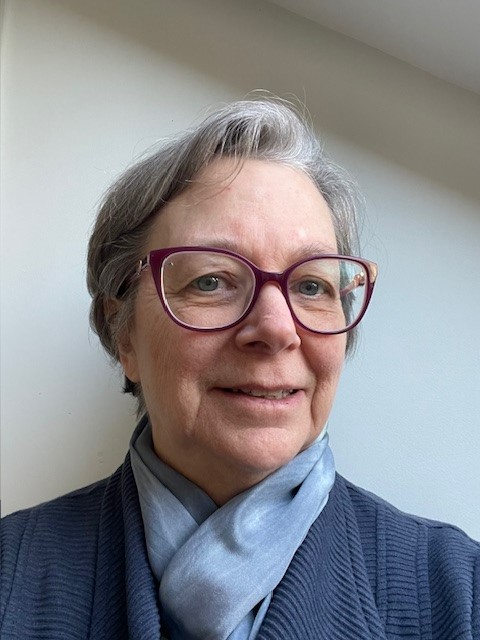
Beverly Estes-Smargiassi joined MassHousing as the Program Manager for the Neighborhood Stabilization Program (NSP) in January 2022, to start up and manage the program. NSP offers grants to non-profits and municipalities to rehab or reconstruct small residential properties throughout the commonwealth. In addition to NSP, Beverly manages the Gateway Housing Rehabilitation Program and oversees the Fire Sprinkler Safety Program and Center for Community Recovery Innovations, which are focused on expanding and improving substance use disorder recovery living.
Prior to joining MassHousing, Beverly was the Assistant Director for Preservation and Community Development at the Boston Mayor’s Office of Housing, where she focused on preserving and recapitalizing affordable units, and also worked on implementing two Choice Neighborhood grants. Her housing and community development experience spans more than four decades, including as a planning and community development consultant to communities in Massachusetts and Connecticut, and as development staff for Dorchester Bay Economic Development Corporation.
She has served as a volunteer Board member for two CDC’s: Urban Edge Housing Corporation and Fenway Community Development Corporation. Beverly has a Bachelor of Arts Degree in Political Science from Gordon College, in Wenham, MA.
John Gilbert, Real Estate Development Project Manager, Way Finders

John Gilbert is the Real Estate Development Project Manager for Way Finders. He has spent the past ten years occupying various leadership roles within the built environment. He brings a unique vision to projects, informed by extensive experience as both an Architect and a Real Estate Developer. John has worked both nationally and internationally for public, private, for-profit, and non-profit enterprises across California, Ecuador, and Massachusetts. His educational background in Environmental Studies, Architecture, and a finance-focused MBA has given him a wide range of knowledge and experience that he brings to his project involvement.
John’s early career experience as a Massachusetts Registered Architect was heavily weighted towards the design of complex, mixed-use urban infill projects within the Boston region. John’s current role as a Real Estate Development Project Manager with Way Finders, a Springfield, Massachusetts based non-profit and Community Development Corporation, has provided him with ample exposure to the multifarious challenges, needs, and opportunities inherent within the Western Massachusetts region and its underlying communities. He has been deeply involved on the “City of Homes” pilot project, a philanthropic and grant-funded effort to revitalize Springfield neighborhoods and build generational wealth through the development of quality, AMI-restricted single/multi-family homes for purchase by first-time homebuyers. Additional project engagements include a 60-unit mixed-income housing development in South Hadley (“The Clover”) slated for a construction start in Q2 of 2025, and early-stage pre-development acquisition and planning efforts on a projected 100+ unit mixed-use, mixed-income, multi-lot urban infill project along the Holyoke High St corridor.
Beyond extensive project involvement within the built environment, John has consulted with and worked directly alongside emerging technology startups within the life sciences and decentralized finance sectors. John is a dedicated change-agent driven by innovation, collaboration, and a desire to create meaningful impact within forward-thinking organizations and amongst the stakeholders they serve.
Carolyn Valli, CEO of Central Berkshires Habitat for Humanity
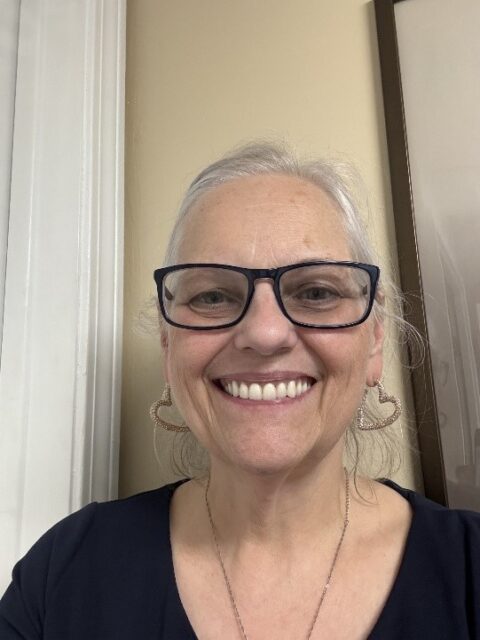
Carolyn Valli is the CEO of Central Berkshire Habitat for Humanity, a transformative leader whose vision and dedication have significantly expanded the organization’s impact. Under her leadership, Habitat has grown from building just one home per year to a projected 27 homes over the next three years, having already completed 50 homes to date.
With a deep commitment to community development, Carolyn has played a pivotal role in securing major grants that have boosted Habitat’s capacity, enabling innovative housing solutions and expanding support for families in need. Her leadership extends beyond home construction—she champions workforce development, energy efficiency initiatives, and partnerships that strengthen neighborhoods.
Carolyn’s strategic approach, grant-writing expertise, and unwavering dedication have made her a driving force in affordable housing and community empowerment in the Berkshires and beyond.
This year’s conference is presented in partnership with the MassMutual Foundation and co-sponsored by the Massachusetts Association of Community Development Corporations (MACDC), Citizens’ Housing and Planning Association (CHAPA), MassHousing, and Massachusetts Housing Partnership (MHP).
